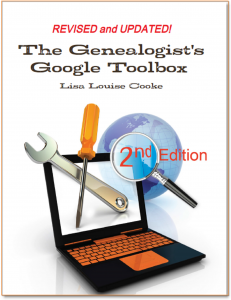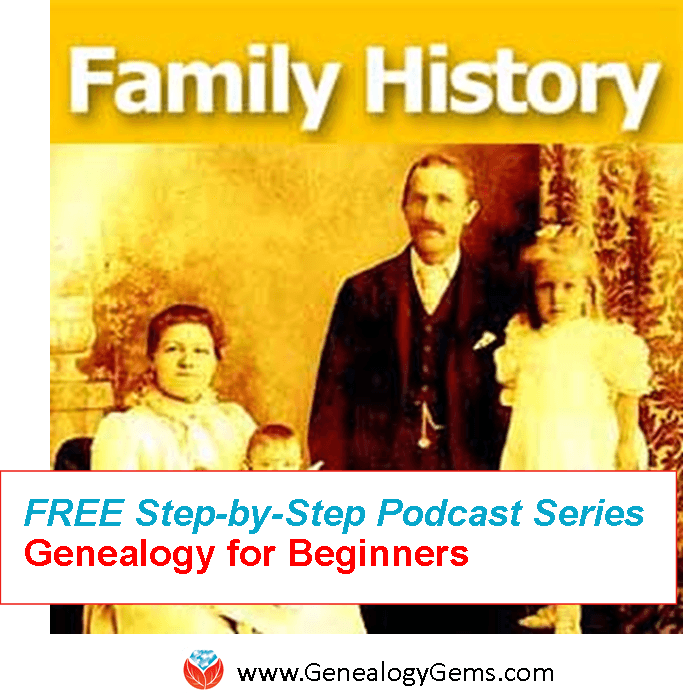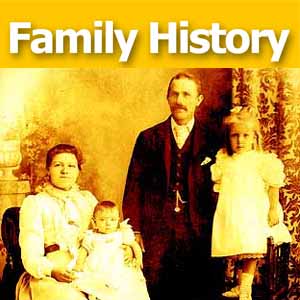Family History Episode 10 – Deeper into Census Records
Republished December 10, 2013
Welcome to this step-by-step series for beginning genealogists—and more experienced ones who want to brush up or learn something new. I first ran this series in 2008-09. So many people have asked about it, I’m bringing it back in weekly segments.
Download the Show Notes for this Episode
Episode 10: Deeper into Census Records
We’re going to start off today by continuing our use of U.S. Federal Census Records. Last episode we located relatives in the 1930 census, and today we’re going to push further back in time to follow the census bread crumb trail.
Then in our second segment we’re going to explore some census enumerations that often go overlooked by family historians with Curt Witcher, the Manager of the nationally-recognized Genealogy Center at the Allen County Public Library in Fort Wayne, Indiana. Curt is a very well-known genealogy lecturer and he has some great tips for tapping in to more obscure census resources. We’ll talk about nonpopulation schedules for the federal census, census substitutes for missing census data (like the 1890 census) and state censuses that may be available, too.
Updates and Links
As I mentioned in the show notes of the last episode, the 1940 census is now available to researchers. Check out those notes for more information. Here are some more updates and links:
- Learn more about nonpopulation schedules and other census records in Ancestry’s online version of The Source.
- The U.S. Census Bureau has online info on state censuses. Learn even more in Ann S. Lainhart’s book State Census Records (Genealogical Publishing Company, 1992). A lot of state censuses are now searchable on Ancestry.com and FamilySearch.org.
- A few fragments of the 1890 census remain. These are searchable at Ancestry.com and FamilySearch.
- The Ancestry database substitute for the 1890 census I mentioned in the show is now supplemented by census substitute databases on Ancestry for just about every state for 1890 and other years. Search for them in the Card Catalog with the search term “1890 census.”
- The National Archives has a portal for census records, too (what’s in them and how to find them).
How to Unsend Gmail email message

Have you ever clicked the Send button on an email message only to seconds later have a wave of regret fall over you? At a moment like that it would be very helpful to know how to unsend Gmail email messages. At one time or another we have all left out vital information, or sometimes worse, said too much. Now you can change your mind and undo what you did!
On June 22, 2015 Google announced the Undo Send feature for Gmail on the Web. By default the Undo Send feature is turned off (that is unless you are already using the Labs version.) To flip the switch and start undoing your sends, simply:
1) Click the Settings gear in Gmail
2) Under the General tab, scroll down until you see Undo Send
3) Click to check the Enable Undo Send box
4) From the drop down menu select how much time you will have to decide to unsend an email message
5) Scroll down the General Settings page and be sure to click the Save Changes button at the bottom of the screen to activate your unsend Gmail email selection.
 Now if you want to unsend Gmail email messages you will be able to do so for the short amount of time you specified (in my example I selected 30 seconds)
Now if you want to unsend Gmail email messages you will be able to do so for the short amount of time you specified (in my example I selected 30 seconds)
Unsend Gmail email and get it right – the second time!
Resources:
 The Genealogist’s Google Toolbox, Second Edition features an entire chapter on using Gmail effectively.
The Genealogist’s Google Toolbox, Second Edition features an entire chapter on using Gmail effectively.
A Tip for Harnessing New Technologies for Genealogy
New technologies don’t stay new. They keep evolving. Here’s a tip for harnessing new and emerging technologies to advance family history research and stay connected with living relatives.
Last week, I was at the BYU Conference on Family History & Genealogy in Provo, Utah. What a friendly, welcoming group! (Be sure to check out the BYU Family History Library here.) All week, I taught sessions and gave a keynote address on various technologies that help our research. The week’s discussions reminded me how quickly technology moves–and how enthusiastically genealogists continue to embrace new opportunities given them by technology.
It’s part of my job to learn about these new technologies and pass the best ones–the “gems” along to you. But here’s a tip I shared during my keynote address that will help you focus on the technologies you care most about: Think about which tasks you want to accomplish with technology, rather than just learning genealogy-specific technology. Then keep up with developments in the technologies that accomplish those tasks.
For example, by now, many of us have used (or at least heard of) Google Translate. We can use it with foreign-language documents and to correspond with overseas relatives and archives. But Google Translate’s functionality keeps improving. “By the audible gasps of the audience” (during my keynote address) reported the FamilySearch blog, “most were not aware that the Google Translate app enables you to literally hold up your phone to the computer screen or typeset document, and it will translate foreign text on the fly for you—a must have free tool when dabbling in nonnative language content.”
Genealogists are really thinking about these issues. The Ancestry Insider blogged about my keynote talk, too, and my observation that genealogists haven’t been embracing digital video at the same speed at which they embrace other forms of digital media. In the comments section of that post Cathy added, “Now what we need to do is get FamilySearch to figure out a way to let us upload our URL YOUTube videos, not only for our deceased, but for our living….Our children and grandchildren don’t write letters, they email, text, instagram. They don’t write journals, they blog. They make videos of current history….We all need to look to the future and [learn] how to save the new technologies.” Cathy gets it!
A special thanks to conference organizers Stephen Young and John Best, who welcomed me and Genealogy Gems Contributing Editor Sunny Morton all week long. They did a fantastic job of organizing a large event while retaining a warm, personal environment.
Continue reading about applying technology to your family history here.
Family History Episode 15 – More Tips for Contacting Distant Relatives

Listen to the Family History: Genealogy Made Easy podcast by Lisa Louise Cooke. It’s a great series for learning the research ropes and well as refreshing your skills.
Originally published 2009
Republished January 21, 2014
https://lisalouisecooke.com/familyhistorypodcast/audio/fh15.mp3
Download the Show Notes for this Episode
Welcome to this step-by-step series for beginning genealogists—and more experienced ones who want to brush up or learn something new. I first ran this series in 2008-09. So many people have asked about it, I’m bringing it back in weekly segments.
Episode 15: Genealogy Cold Calling II: 14 Tips for Contacting Distant Relatives
Connecting with someone who knows about our ancestors can really boost our research results—and even create new relationships among living kin. But it’s not always easy to send that first email or make that call.
In today’s episode we talk about the skill of “genealogical cold calling.” Relationships are key to genealogical success and by following 14 genealogical cold calling strategies you will find your research relationships multiplying. We’ll chat with my cousin, Carolyn Ender, who has conducted hundreds of telephone interviews. She has a knack for quickly connecting with folks she doesn’t know over the telephone in ways that put them at ease and bring to light the information that she’s looking for.
But first, we do some follow up with an email from a listener about family trees. Then, I share a little story that puts into practice what we’ve learned so far in this podcast series.
14 Steps to Genealogical Cold Calling Success
#1. Identify the person you want to call.
#2. Locate the person’s phone number. Below are some great websites for locating people you don’t know. The list is updated from the one given in the show. And Whowhere.com now has an app for Android, iPhone and other mobile devices. Check it out
Don’t forget to search the entire metro area, not just one city. Try just searching their first name particularly if it’s not a really common first name. Try and track down their number through other relatives or researchers. If all else fails consider posting on a message board for the surname
#3. Prepare ahead for making the call.
Every tough job gets just a little easier when you do your homework first. Follow these tips:
- Take into account a possible difference in time zones.
- Choose a time when you are not too rushed
- Do a brief review of the family you are researching so it’s fresh in your mind
- Make note of specific questions you would like to ask.
- Have your genealogy software program open or your written notes at your fingertips.
#4. Get up the “nerve” to call.
Remind yourself how valuable this person’s information could be to your research. If he or she is quite elderly, remember that none of us will be around here forever so you need to make the call today! Say to yourself: “I can do this. This is important!” And be positive and remember, all they can do is say “no thank you.”
#5. Introduce yourself.
Give your first & last name & tell them the town and state where you live. Then tell them the family connection that you share, and tell them who referred them to you or how you located them before launching into why you’re calling or what you want.
#6. Overcome reluctant relatives.
Be ready to share what you’ve learned, and to share your own memories of a relative that you have in common. Mention something of particular interest in the family tree that might pique their interest.
If they are very hesitant you could offer to mail them some information and offer to call back once they’ve had a chance to look at it. That way they can sort of get their bearings too.
#7. What to do during the call
You’ll want to take notes during the phone call. Try a headset which will help to free up your hands for writing. Handwriting is preferably over typing.
Take the opportunity to not just get new information but also to confirm information that you already have–just to make sure it’s correct.
If you have a way to record the call, you don’t have to take notes and focus all of your attention on the conversation, and then transcribe the recording later. If you want to record, ask permission: in some places, it’s illegal to record a conversation without permission and it’s common courtesy to say you’re taping them. But it might put off a stranger; perhaps taping could wait until a second call.
#8. Leave a detailed voice mail message if there’s no answer.
State your name and that you would like to talk with them about the family history. Leave your phone number and tell them that you will call them back. Consider leaving your email address and suggesting they email you with a convenient time to call back.
Be sure and keep track in your genealogy database each time you call and what messages you leave. Having a log of calls and voice mail messages you’ve left will help you keep track.
#9. “Must-ask” questions.
- “Do you or anyone else in the family have any old family photographs, or a family Bible?
- (Reassure the person that you would only be interested in obtaining copies of any pictures or mementos they might have.)
- “Do you know anyone else in the family who has been doing family research?”
- “May I have your permission to cite you as a source in print in the future?”
- “Is it OK with you if I keep in touch from time to time?”
#10. Wrap up the call.
- Ask for their mailing address and email address.
- Offer to give them your address and phone number.
- Let them know you would be pleased to hear from them if they come across any other information, pictures, etc.
#11. Document the call.
Sit down at the computer or your notepad right away and make detailed notes about the phone conversation while it’s fresh in your mind. Include the person’s name, address, phone number and date of conversation. Make notes regarding any items you think may be questionable to remind you to go back and do more research on those points. At the bottom of the page list the ACTION items that come to mind that you want to follow up on based on the conversation. Enter their contact information into your genealogy database as well as your email contact list.
#12. Enter new information Into your genealogy database.
This is a must. Do it right away while it’s on your mind.
#13. Create an action item list.
Create action items based on what you learned. Ask yourself “What are the logical next steps to take considering what you’ve learned through this interview?” The call is not the end result, it’s a step in the research process, and it can really help to make this list now, and while it’s fresh in your mind.
#14. Follow up.
Send the person a written note or email thanking them for taking the time to talk with you. If the person mentioned that they would look for pictures or would look up something in a family Bible etc., mention in your note that you would still be interested in anything they can help you with and that you would be glad to pay any copying expenses, postage etc. Offer to provide copies of your information or copies of pictures you have etc. You never know: they might catch the genealogy bug and become your new research partner!
Next, put their birthday on your calendar and send them a card on their next birthday. It’s another way of keeping the connection going and expressing that you really do appreciate all their help. Try this service: Birthday Alarm.
Occasionally make a follow up call to check in and see how they are doing, share any new family items she’s come across recently, and ask if they have they heard or found anything else.




